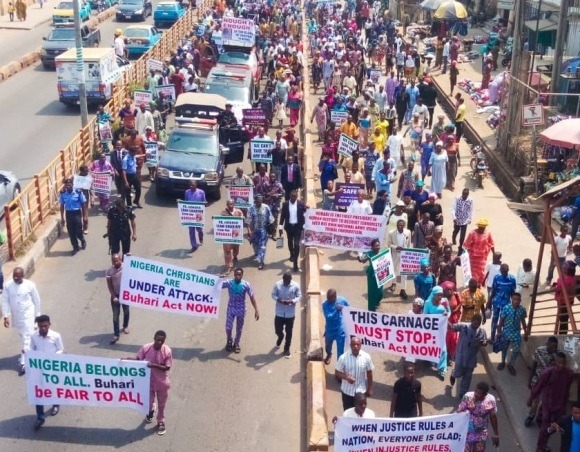Reprinted with permission from Washingtonexaminer.com
The unconscionable decision in November by the U.S. Department of State to remove Nigeria from its annual Countries of Particular Concern list raises one simple question: Why?
Just last year, the State Department concluded that Nigeria had been “engaging in or tolerating particularly severe violations of religious freedom.” The department then rightly added Nigeria to its list of designated CPCs to pressure the West African nation to step up efforts to defend the rights and safety of its own people. Yet precious little has changed in the past 12 months that would warrant removal of CPC status.
Indeed, conditions in Nigeria continue to decline. Nonstate actors such as Boko Haram, Islamic State in West Africa Province, and Fulani militants continue to threaten the religious freedoms and lives of civilians. Armed bandits routinely kidnap religious school children for ransom, most recently in September when 73 students were abducted from a school in northwestern Nigeria. Armed attacks remain a primary security threat throughout the country. In one recent incident, gunmen attacked two majority Christian villages in the northern state of Kaduna, killing 40 people. To a large extent, these crimes go unprosecuted.
Furthermore, the rampant persecution of individuals based on religion or beliefs is not limited to violence at the hands of terrorists. Nigerian courts and state officials frequently arrest and imprison individuals on blasphemy-related charges, a pattern that runs contrary to widely embraced international religious freedom and human rights practices.
Daily headlines make it clear: Nigeria is a country in crisis. Former U.S. Ambassador to Nigeria John Campbell has gone so far as to call Nigeria a failed state, one that appears to have reached the point of no return.
Why then would the U.S. abandon its primary source of diplomatic leverage by stripping Nigeria of its CPC status before any measurable improvements had been observed? Despite widespread confusion and anger within Congress and the global public over the State Department’s action and ensuing calls for explanations, the Biden administration has remained strangely silent.
From the perspective of the human rights community and Nigerians themselves, this decision seems to make no sense, while at the same time emboldening bad actors in Nigeria and elsewhere around the world. The U.S. Commission on International Religious Freedom, a bipartisan agency tasked with monitoring the universal right to freedom of religion or belief abroad, has condemned the decision as appalling.
The vitality of religious freedom is one measure of a country’s stability. It is vital, therefore, that the U.S. not ignore the major contributing factor to the rapidly escalating conflicts in Africa’s most populous country: the failure of the Nigerian government to protect the fundamental freedom of religion or belief of its citizens.
The U.S. government has robust diplomatic tools at its disposal. It should use them. It’s not too late for the State Department to reevaluate and reverse course, or at least publicly provide a compelling human rights reason and elaborate on its decision to lift the CPC designation. It should heed the calls from members of Congress, USCIRF, and religious groups to reinstate Nigeria’s CPC designation with no waivers as was done in 2020. It must also provide key leadership that will help Nigeria right the ship, lest Campbell’s forecast prove true. And finally, even as the State Department applies pressure on Nigeria to protect the rights and lives of all Nigerians, it must review U.S. aid to the country to formulate a comprehensive strategy that will mitigate the violence and safeguard religious freedom.
Randel Everett is the founder and president of 21Wilberforce.

